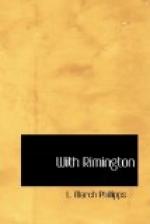“It is worth getting up at this time to enjoy the delicious, pure, and fresh air. The glow of sunrise is in the sky, but not yet the sun. There are some long streaks and films of rosy cloud along the east. Already, after five shots, the whole kopje is enveloped in dust and reddish smoke from the bursting lyddite, but elsewhere between us and the sunrise the hills are a perfect dark blue, pure blocks of the colour. The Lancers on their horses show black against the sky as they canter, scattering through the underwood with graceful slanting lances. At slow deliberate intervals the long gun tolls. Dead silence is the only reply. The sun rises and glares on the rocky hills. Not a living thing is to be seen.”
LETTER VI
MAGERSFONTEIN
MODDER RIVER CAMP,
December 13, 1899.
When we were camped a day’s march south of this, two Boers brought in a wounded man of ours in a Cape cart. “You will never get to Kimberley,” they said to us. “It will take better men than you to stop us,” said we. “Not a bit of it,” said they, and off they drove. As it turns out, they were nearer the mark than we were.
While I write this, early on the morning of the 13th, you at home may just be reading in the papers the accounts of our last two days’ disastrous fighting. It was a defeat, but yet it was a defeat which was not felt nor realised by the bulk of the army. It was a blow that fell entirely on one brigade, and the greater part of our force was still awaiting the order to advance, and expecting to engage the enemy when already the attack, unknown to us, had been delivered and repulsed.
Last Sunday, December 10th, about 2 P.M., we moved out of camp northward towards the point of the big hill, that, like a cape, juts south into the plain. With all our guns ranged about the point of the hill, we then proceeded to thrash and batter it with shell-fire. No gun-fire that we have had as yet has approached this for rapidity. The batteries roared ceaselessly from the plain; the big 4.7 lifting up its voice from a little in the rear high above the din. The day was cloudy, and rain fell at intervals, but towards the evening it cleared. My troop was on the extreme left front, on the west side of the hill, and we had a fine view of the effect as the shells burst one after another, or sometimes three or four together, all along the hill flank, up on the crest, or in the plain along the base.
“5 P.M.—The hill is all one heavy dull hue in the sombre evening light, and against it the sharp glints of fire as the shrapnel bursts, and the round puff-balls of white smoke show vividly. Every now and then a great curtain of murky vapour goes up to show where the old lyddite-slinger in the rear is depositing his contributions. We had three field-batteries engaged, the naval twelve-pounders, Joey, and the pop-guns; about thirty guns altogether.”




